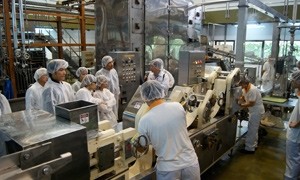Water management in India – is it your problem?

The report – Water and Climate Change: an Integrated Approach to Adaptation Challenges – is based on a three year research project at the basin of India’s second largest river, the Godavari; an important agricultural area with rice, sugar cane and maize farming.
Researchers found that food production, particularly rice, will be negatively impacted and water supplies strained by the droughts and floods across the basin that will be caused by the forecast climate change over the coming decades.
Dr Uduya Sekhr Nagothu of Norwegian research institute Bioforsk and one of the book’s editors, told FoodNavigator-Asia that the “results of the study will be able to contribute to policy and management and will be relevant to farmers, government and all stakeholders,” including food and beverage brand owners.
The methodological approach put forward in the book will give policymakers the holistic overview they need to develop future sustainable and equitable water management strategies, Nagothu said.
“Food and beverage companies should be a part of it… I think it is essential that they can contribute,” he added.
Sustainability – an Indian focus
Reform and education on water management and usage needs to be implemented and investments also need to be made in water and labour saving technologies, the study noted.
“Simple interventions that are practical and locally adaptable is what the aim is,” Nagothu said, and this will require a network between food and beverage companies, government, farmers and agencies.
“Food and beverage companies are now getting in direct contact with farmers and so they have a role to play in educating farmers and providing equipment” to ensure sustainable water use and farming methods, the editor said.
Dr Kuppannan Palanisami, co-editor of the book, added: “It is critical that we adopt a multi-level approach to the problem of climate change and water management… We need to look at issues at farm level right up to the whole river basin if we are to successfully deal with the challenges.”
Food industry pledges
Coca-Cola, PepsiCo, Unilever and Nestlé are a few examples of internationals that are already working to address the issue of water sustainability in India.
PepsiCo has pledged to improve its water use efficiency in India by 20% per unit of production by 2015 and Unilever harvests rain water at a quarter of it Indian factories for use during its production.
In October last year, India’s minister for water resources, Pawan Kumar Bansal, pledged to improve the efficiency of the country’s surface water irrigation system by 20% within five years.
Nagothu said that while 20% may not be achievable, there is opportunity to “move forward, but it requires a lot of work.”
The research project on the Godavari River Basin was funded by the Norwegian ministry of foreign affairs and was the collaborative work of the Norwegian research institute Bioforsk, the Indian Institute of Technology Delhi and the New Delhi and International Water Management Institute.
















